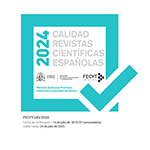Intersectionality as an analytical tool for critical social work practice: reflections on unwanted solitude
Abstract
This article contains a proposal for developing the critical practice of social work. It is based on an understanding of this profession as crafting connections that encourage awareness of this form of practice, and it is proposed to incorporate the intersectional perspective when engaging in practice: literacy, the identification of issues and the structural contradiction that it produces, and reflective experimentation. It is explained that the use of intersectionality as an analytical tool can be of interest in the practice of social workers/agents because it facilitates a contextualised understanding of the complexity with which oppression is experienced, easing the task of making connections directed at achieving social justice. Moreover, with the aim of opening up dialogue on the possibilities of this proposal, unwanted solitude is defined in light of intersectionality and the role of the social worker in managing public actions to combat this issue is explored.
Downloads
Article download
License
In order to support the global exchange of knowledge, the journal Cuadernos de Trabajo Social is allowing unrestricted access to its content as from its publication in this electronic edition, and as such it is an open-access journal. The originals published in this journal are the property of the Complutense University of Madrid and any reproduction thereof in full or in part must cite the source. All content is distributed under a Creative Commons Attribution 4.0 use and distribution licence (CC BY 4.0). This circumstance must be expressly stated in these terms where necessary. You can view the summary and the complete legal text of the licence.









